The introduction of artificial intelligence (AI) has become a global game-changer in every sector. AI for sales prospecting is not just a buzzword; it’s an approach to restructuring how businesses identify, engage, and convert potential leads.
This useful blog delves into AI-driven sales prospecting, offering insights into its definition, effective implementation strategies, top tools, challenges, best practices, real-world success stories, and future trends.
What is AI for Sales Prospecting?
AI for Sales Prospecting refers to the use of artificial intelligence (AI) technologies to automate, enhance, and optimize the process of identifying, engaging, and converting potential customers. AI-powered tools analyze large datasets, predict customer behavior, personalize outreach, and streamline lead qualification, allowing sales teams to focus on high-potential prospects.
According to a recent HubSpot report, 52% of sales professionals said they have utilized artificial intelligence (AI) to analyze data and use automated tools to help them make decisions about forecasting, pipeline analysis, and lead scoring.
By analyzing vast amounts of data from various sources—such as social media, CRM systems, and market trends—AI can identify patterns and predict which prospects are most likely to convert. This not only increases efficiency but also allows sales teams to focus their efforts on high-potential leads, ultimately driving better results.
How to Use AI for Sales Prospecting Effectively In 5 Simple Steps?
Implementing AI in sales prospecting requires a strategic approach. Here’s a step-by-step guide to harnessing the power of AI effectively.
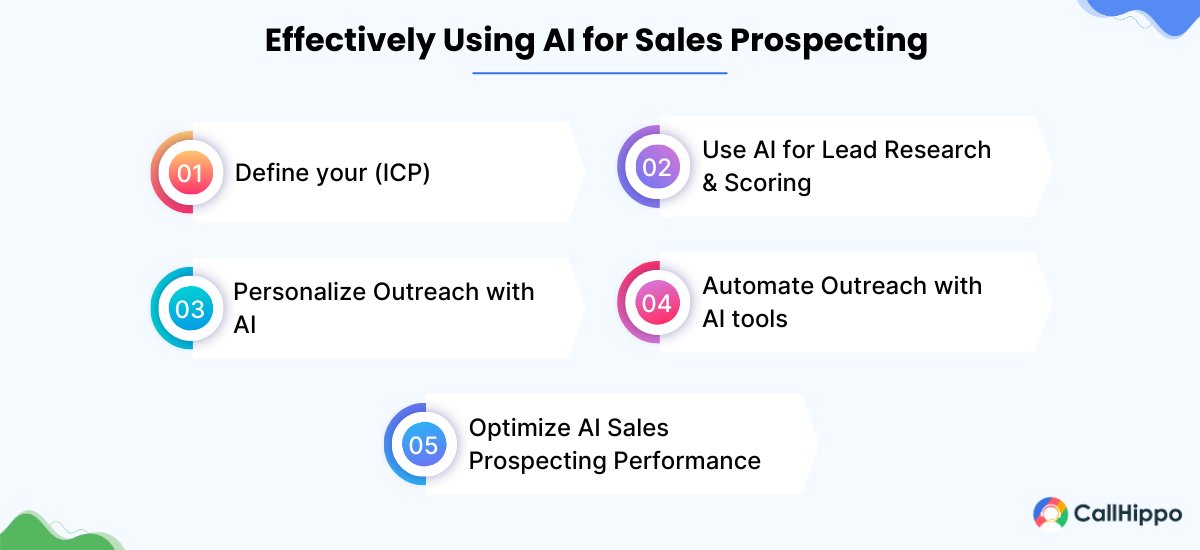
Step 1: Define your Ideal Customer Profile (ICP)
The first step is to define your Ideal Customer Profile (ICP). Without a clear understanding of who your best customers are, even the most advanced AI tools won’t generate valuable leads. Think of your ICP as the blueprint that helps AI identify the right prospects—those most likely to convert into long-term customers.
Start by analyzing your existing customer base. Look for common traits among your highest-value clients—things like,
- Industry
- Company size
- Job roles
- Pain points
- Purchasing behavior
AI can speed up this process by analyzing large volumes of customer data and identifying trends that humans might overlook. It can also use predictive analytics to refine your ICP based on real-time market trends and past sales performance.
Another valuable AI feature is intent data analysis. This allows AI tools to track potential customers’ online activities—such as search behavior, content downloads, and website visits—to determine their interest level.
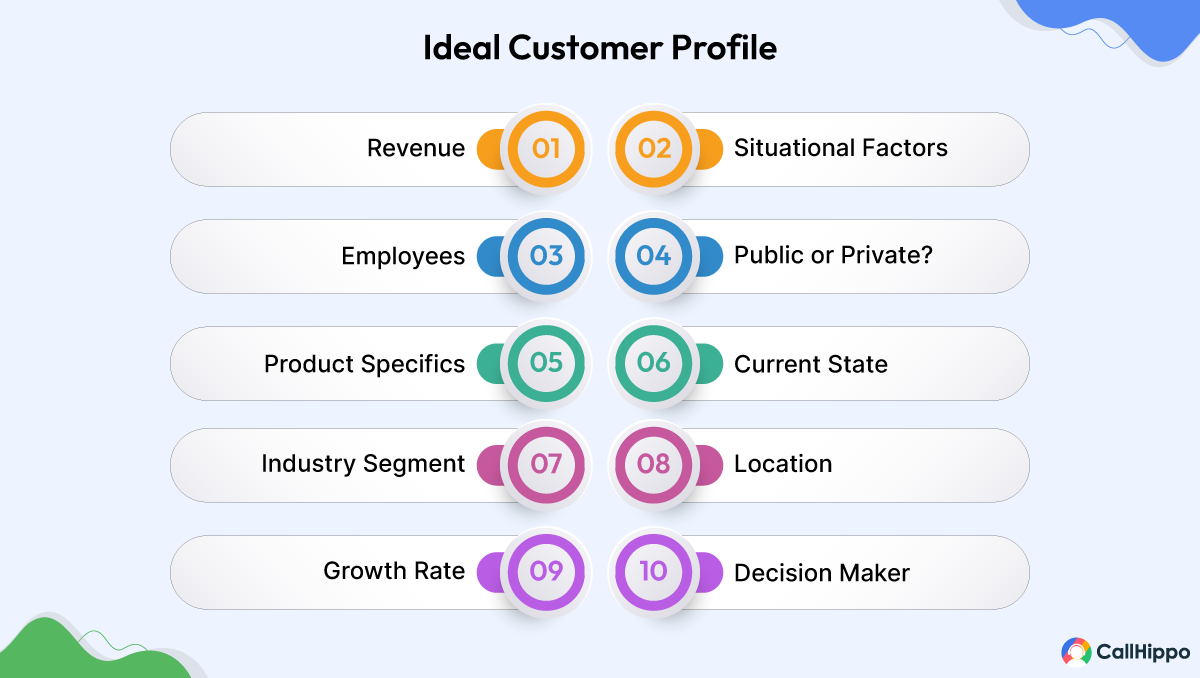
With a well-defined ICP, AI can automatically filter and rank leads that fit your ideal customer profile, ensuring your sales team focuses on high-value opportunities instead of wasting time on poor-quality leads.
Step 2: Use AI for Lead Research & Scoring
Once your ICP is in place, the next step is using AI for sales prospecting to research and score potential leads. Traditionally, sales teams spent countless hours manually searching for prospects, gathering data, and deciding which leads were worth pursuing. AI eliminates this guesswork by automating the entire process.
AI-powered tools can scan multiple data sources—company websites, social media profiles, job postings, press releases, and CRM databases—to compile a comprehensive profile of each prospect. These tools don’t just gather data; they analyze it, identifying buying signals that indicate when a lead is ready to engage.
After collecting this data, AI assigns each lead a score based on predefined criteria such as company size, decision-making power, engagement history, and intent signals. This is where sales prospecting AI becomes a powerful resource.
The result? A smarter, more efficient prospecting process that helps your sales team spend less time researching and more time closing deals.
Step 3: Personalize Outreach with AI
A common mistake in sales prospecting is sending the same generic message to every lead. Today’s buyers expect a personalized experience, and AI makes it possible to deliver tailored outreach at scale. AI analyzes a lead’s behavior—such as the content they’ve engaged with, their job title, and their previous interactions with your brand—to craft highly relevant messages.
For example, if a prospect recently visited your pricing page, AI can trigger an email addressing their potential concerns about cost and value.
AI-powered tools also help sales reps create personalized email sequences, LinkedIn messages, and even call scripts. Some AI platforms can generate customized subject lines, body text, and follow-up recommendations based on the prospect’s engagement history.
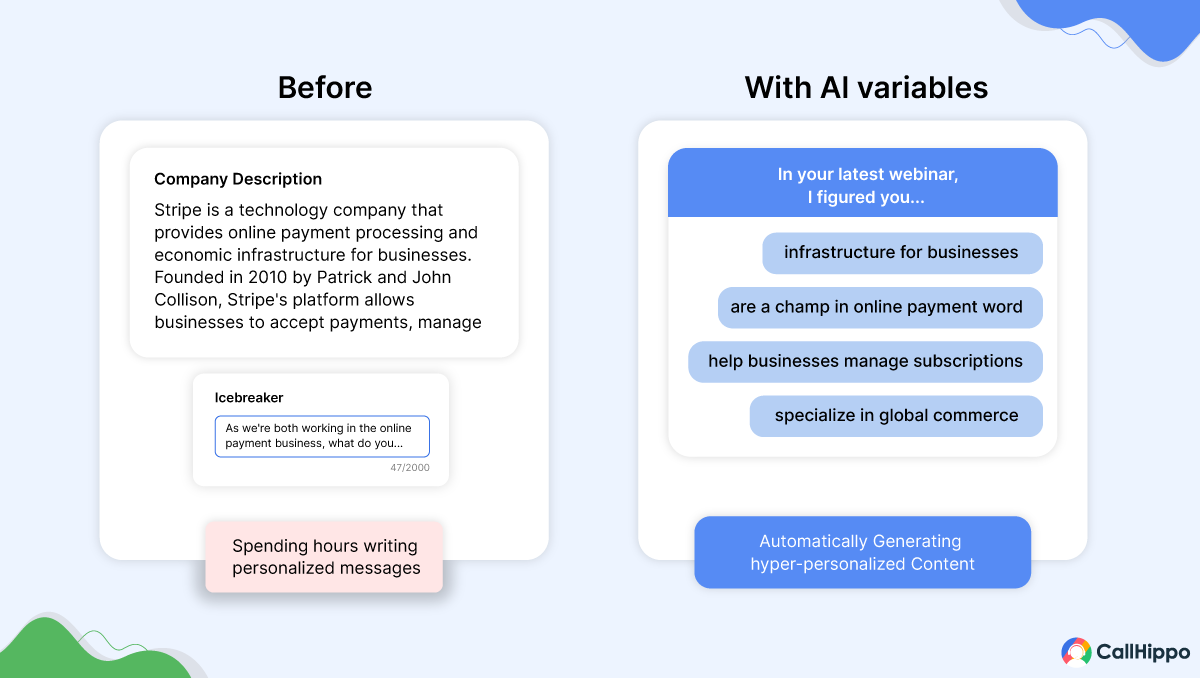
This significantly improves response rates and increases the chances of a meaningful conversation. Beyond email, AI-driven chatbots and intelligent virtual assistants provide real-time engagement.
These AI tools can answer questions, book meetings, and qualify leads 24/7. The key is to use AI to enhance personalization while keeping the human touch in your interactions. AI helps you scale personalization efforts, making every lead feel like they’re receiving one-on-one attention.
Step 4: Automate Outreach with AI tools
Scaling sales outreach manually is nearly impossible, which is why AI-driven automation is a must. AI sales engagement platforms handle repetitive tasks like follow-up emails, scheduling meetings, and tracking interactions, ensuring your sales team stays focused on building relationships.
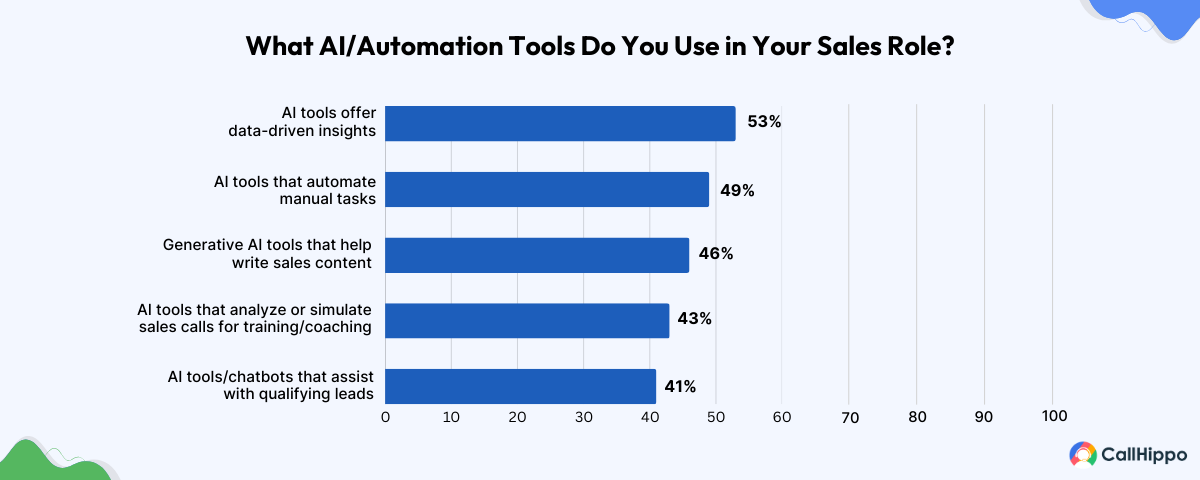
One of the most powerful aspects of AI sales prospecting is dynamic sequencing. AI tools adjust outreach based on a lead’s actions. For instance, if a prospect opens an email but doesn’t reply, AI might schedule a follow-up with a different subject line or messaging angle. If a lead clicks on a product demo link, AI could notify a sales rep to reach out with a personalized offer.
AI-driven voice agents also play a huge role in outreach automation. They engage prospects in real-time, answering basic questions, qualifying leads, and even guiding them to the next step in the sales funnel. AI-powered phone dialers can prioritize calls based on lead scores, ensuring that sales reps spend their time talking to the most promising prospects.
The key benefit here is efficiency. By automating outreach, sales teams can engage more leads without increasing their workload. This results in faster response times, more consistent follow-ups, and a higher volume of outbound calling and conversations.
Step 5: Monitor & Optimize AI Sales Prospecting Performance
Implementing AI for sales prospecting isn’t just about setting it up and letting it run it requires ongoing monitoring and optimization. AI provides deep insights into sales performance, helping teams refine their strategies in real-time.
AI-powered analytics dashboards track key metrics such as email open rates, response rates, call conversion rates, and deal closures. These insights help sales teams understand what’s working and what needs improvement. For instance, if a particular outreach sequence has low engagement, AI can suggest changes based on data-driven predictions.
A/B testing is another area where AI shines. AI tools can run automated experiments with different messaging, subject lines, call scripts, and engagement tactics to determine which approaches yield the best results. This continuous testing ensures that sales prospecting strategies remain effective over time.
Best AI for Sales Prospecting: Top Tool to Consider
With the rapid advancement of artificial intelligence, sales teams now have access to powerful AI-driven tools that streamline prospecting, enhance lead generation, and improve conversion rates. One of the most innovative solutions in this space is AI Sales Agent by CallHippo, a cutting-edge tool designed to revolutionize the way businesses approach sales prospecting.
AI Sales Agent: The Ultimate AI-powered Sales Assistant
AI Sales Agent is an intelligent sales automation platform that leverages machine learning and natural language processing to identify, engage, and convert high-quality leads. Unlike traditional sales prospecting methods, which rely heavily on manual research and outreach, this AI-driven solution automates key processes while maintaining a personalized touch.
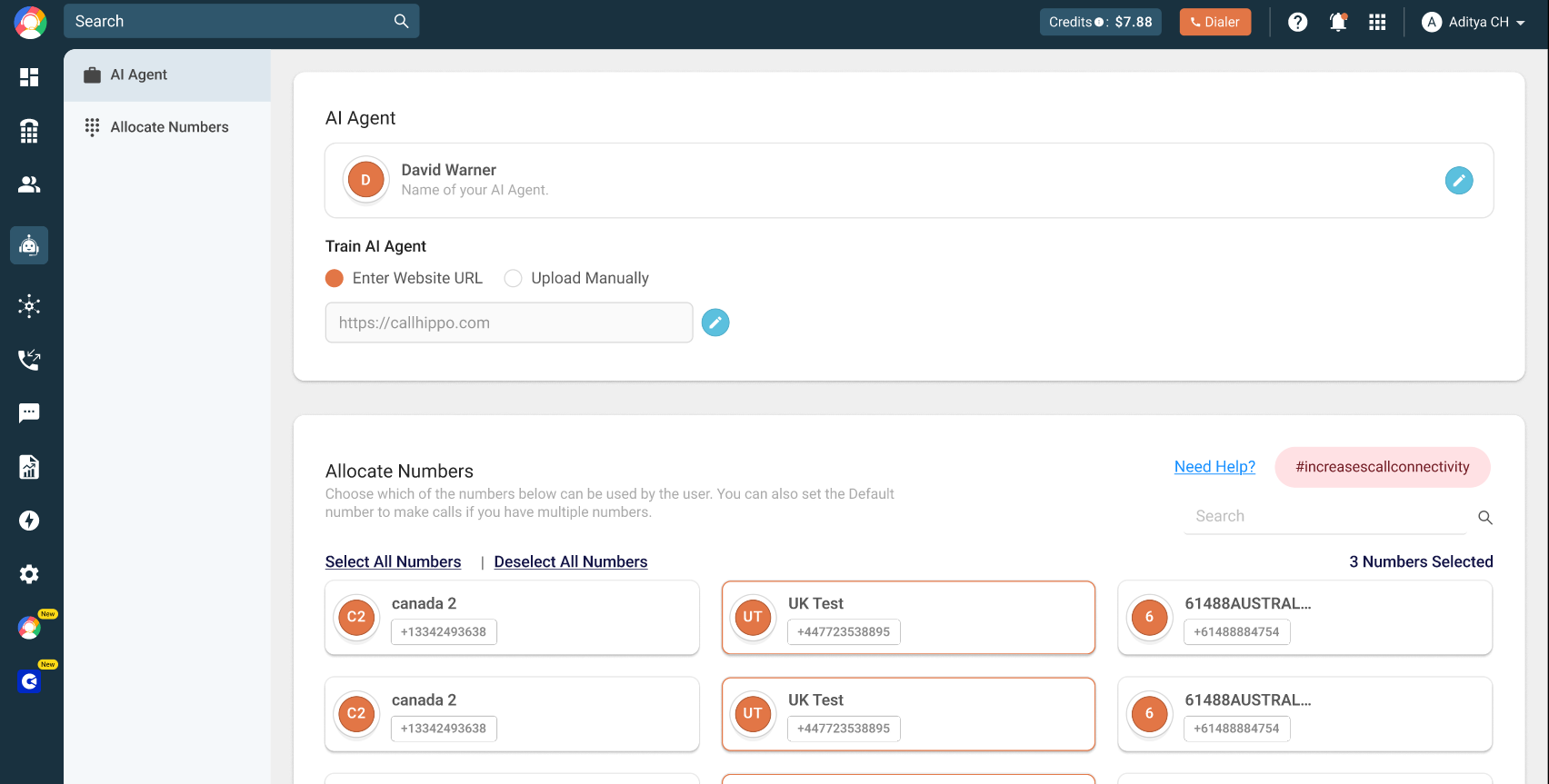
1. AI-powered Lead Identification
AI Sales Agent scans multiple online sources, including websites, social media, business directories, and CRM data, to identify potential leads that match your ideal customer profile. By analyzing real-time market trends and behavioral data, ensures that your sales team focuses on leads with the highest conversion potential.
2. Predictive Lead Scoring
Not all leads are created equal. AI Sales Agent uses predictive analytics to assess a lead’s likelihood of converting based on past interactions, industry trends, and customer behavior patterns. This scoring system helps sales teams prioritize high-value opportunities instead of wasting time on low-quality prospects.
3. Automated Multi-channel Outreach
One of the standout features of AI Sales Agent is its ability to automate outreach across multiple channels, including email, LinkedIn, chatbots, and SMS. The AI optimizes the timing and messaging based on prospect engagement, ensuring that follow-ups happen at the right moment with the right content.
4. Hyper-personalized Messaging
AI Sales Agent doesn’t just send automated messages—it personalizes them based on each prospect’s unique needs, pain points, and interactions. By analyzing previous conversations, website visits, and engagement history, the AI crafts messages that resonate with potential customers, significantly increasing response rates.
5. AI-Driven Call Assistance & Scheduling
With AI-powered voice capabilities, AI Sales Agent can handle initial prospecting calls, answer basic inquiries, and even schedule meetings with qualified leads. This reduces the workload on sales reps while ensuring that only the most interested prospects reach the human sales team.
6. Real-time Sales Insights & Analytics
AI Sales Agent provides deep insights into sales performance by tracking email open rates, response rates, call engagement, and overall pipeline activity. The AI continuously analyzes this data and suggests improvements to optimize prospecting strategies.
With AI Sales Agent
- AI-powered lead scoring
- Automated outreach
- Personalized messaging
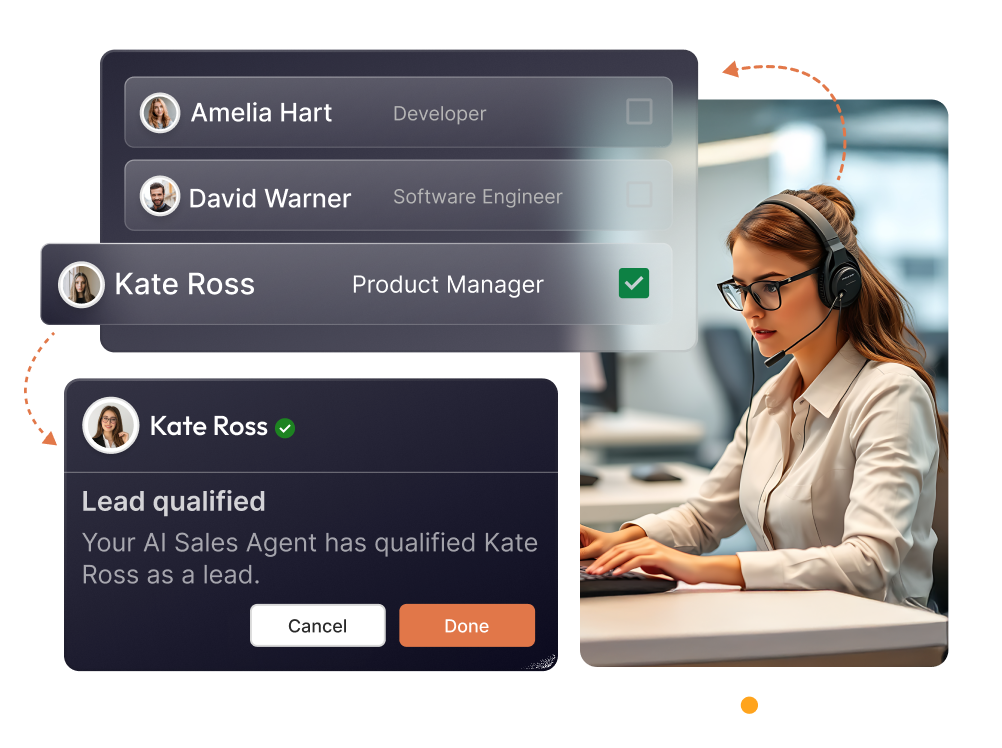
4 Key Use Cases of AI Sales Agent
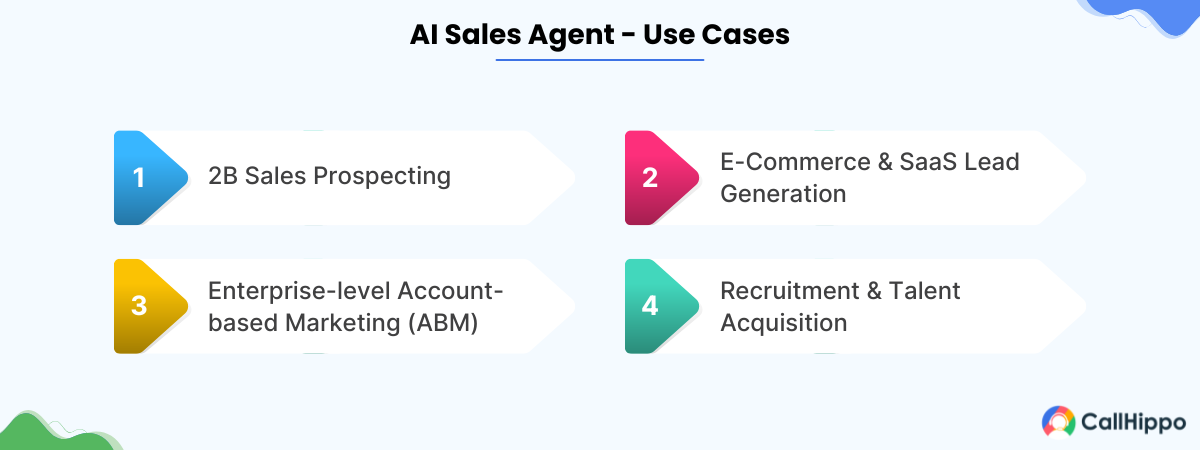
1. 2B Sales Prospecting
Businesses targeting other companies can use AI Sales Agent to identify decision-makers, analyze company growth trends, and engage with potential clients through automated yet personalized outreach.
2. E-Commerce & SaaS Lead Generation
For e-commerce and SaaS companies, AI Sales Agent can track user behavior, and segment leads based on interest levels and response.
3. Enterprise-level Account-based Marketing (ABM)
Large enterprises using ABM strategies can leverage AI Sales Agent to identify high-value accounts, tailor messaging for specific industries, and automate outreach while maintaining a human-like engagement style.
4. Recruitment & Talent Acquisition
AI Sales Agent is not limited to sales—it can also help HR and recruitment teams identify top candidates, automate outreach to potential hires, and engage with job seekers in a scalable manner.
Top 3 Challenges of Using AI for Sales Prospecting
AI is changing the game for sales teams, making lead generation faster and more efficient. But it comes with some drawbacks. If businesses don’t use it carefully, they could end up with bad data, ethical concerns, or even an over-automated sales process that feels cold and robotic. Let’s take a closer look at the biggest hurdles and how to handle them.
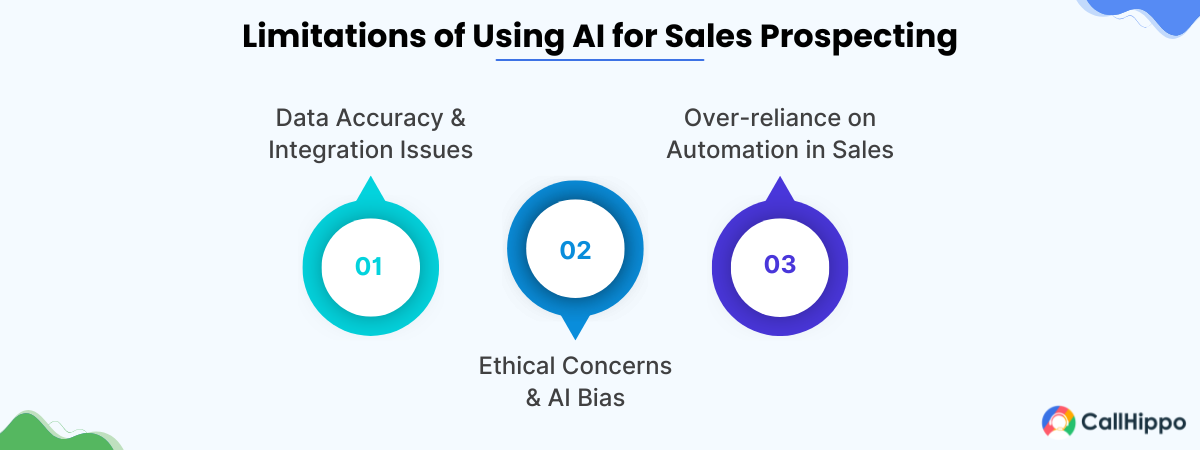
1. Data Accuracy & Integration Issues
AI is only as good as the data it works with. If the information it pulls is outdated, incorrect, or incomplete, sales teams could waste time chasing leads that aren’t a good fit. Imagine sending emails to people who no longer work at a company or pitching a service to someone who isn’t even in your target audience. That’s what happens when AI relies on bad data.
Another big challenge is integrating AI with existing tools. Most sales teams already use CRMs, email marketing platforms, and other software. If AI doesn’t work smoothly with these systems, it can create a messy, disconnected process. Leads might get lost, data could be duplicated, and sales reps could end up with conflicting information.
The fix?
Businesses need to clean their data regularly and choose AI tools that integrate well with their existing setup. And even though AI can automate a lot, humans still need to double-check the insights before making big decisions.
2. Ethical Concerns & AI Bias
AI isn’t neutral—it learns from past data, which means it can inherit biases. If a company has always targeted a certain type of customer, AI might continue to prioritize those leads while ignoring other potential buyers. This can make sales strategies narrow and less inclusive.
There’s also the issue of privacy. AI collects and analyzes a ton of personal data, and people are more aware than ever about how their information is being used. If businesses aren’t careful, they could end up violating data protection laws like GDPR and CCPA, or simply making potential customers uncomfortable.
To avoid these problems, companies should regularly check their AI tools for bias and make sure they’re using data responsibly. Being transparent with prospects about how their information is used can also help build trust.
3. Over-reliance on Automation in Sales
AI can automate a lot, but it shouldn’t replace human connection. Some companies go all-in on automation, assuming AI can handle everything from lead generation to closing deals. But customers still want to talk to real people, especially when making big purchasing decisions.
Overusing AI can also make sales outreach feel robotic. If a prospect gets a series of AI-generated messages that all sound the same, they’ll probably ignore them. AI can help personalize outreach, but it can’t fully replace the warmth, creativity, and adaptability of a human salesperson.
Real-World Examples of AI for Sales Prospecting Success
AI is no longer just a futuristic concept—it’s already helping businesses transform their sales processes. From startups to large enterprises, companies are using AI-driven tools to find high-quality leads, personalize outreach, and improve conversion rates. Let’s explore some real-world success stories that showcase the power of AI in sales prospecting.
1. LivePerson
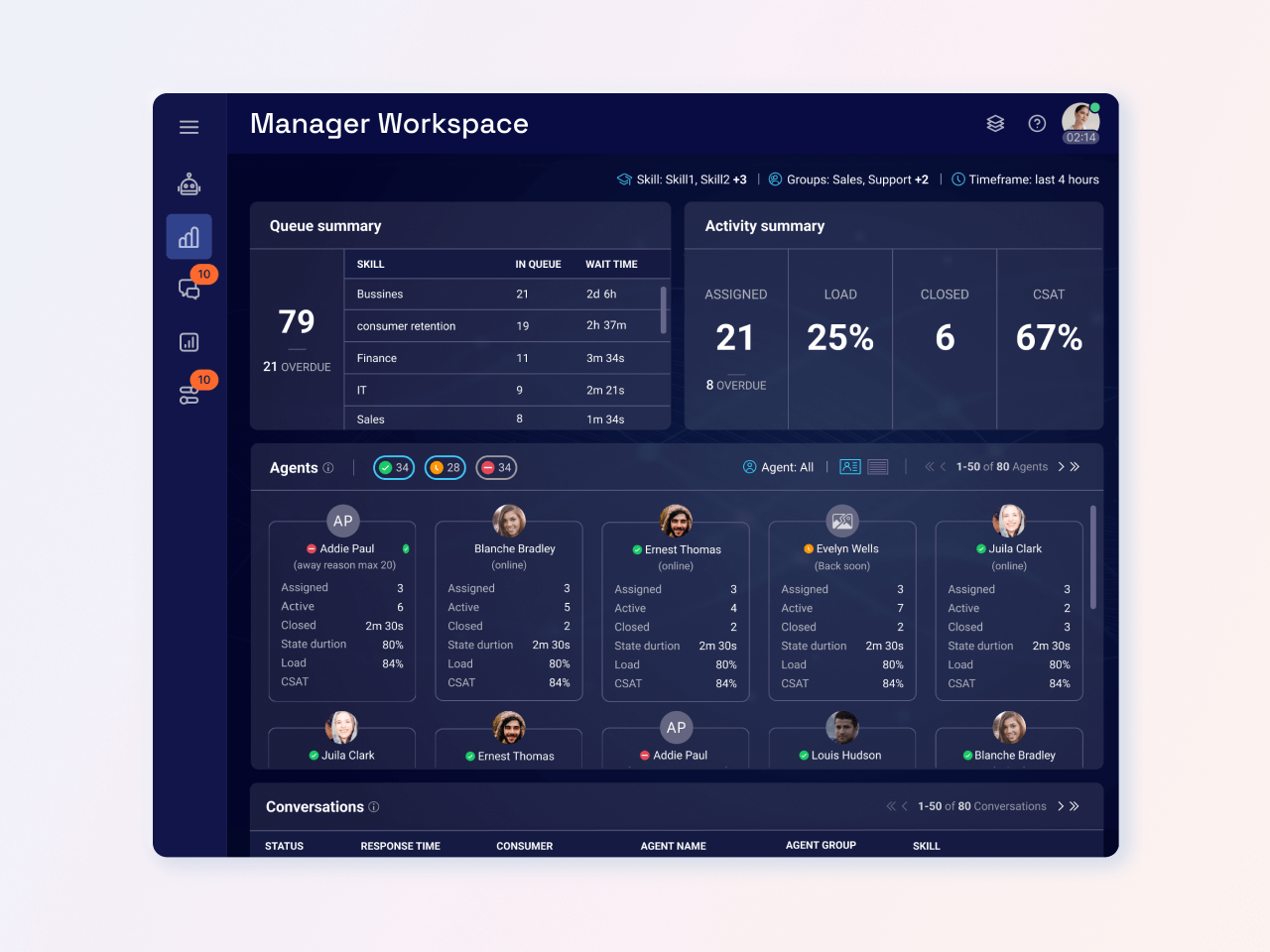
LivePerson’s use of AI to improve the speed and intelligence of sales prospecting is upsetting how companies locate and engage with potential clients. Rather than depending on traditional cold calls and lengthy email chains, LivePerson’s AI-powered chatbots engage website visitors in genuine dialogue by posing pertinent questions to learn about their needs.
This makes encounters more interesting since it feels natural rather than robotic. Plus, the platform analyzes engagement levels, behavior, and previous interactions using predictive lead scoring, allowing sales teams to concentrate on the prospects who have the highest conversion rates.
But AI doesn’t stop at qualification—it personalizes follow-ups, ensuring prospects receive messages that actually matter to them, whether through chat, email, or social media. And because people switch between different platforms, LivePerson’s AI seamlessly connects conversations across multiple channels, so no lead gets lost.
The best part? AI keeps learning, constantly improving its approach to help businesses close deals faster. By automating repetitive tasks and making outreach feel more human, LivePerson proves that AI isn’t just about efficiency—it’s about building real connections that drive sales.
2. 6sense
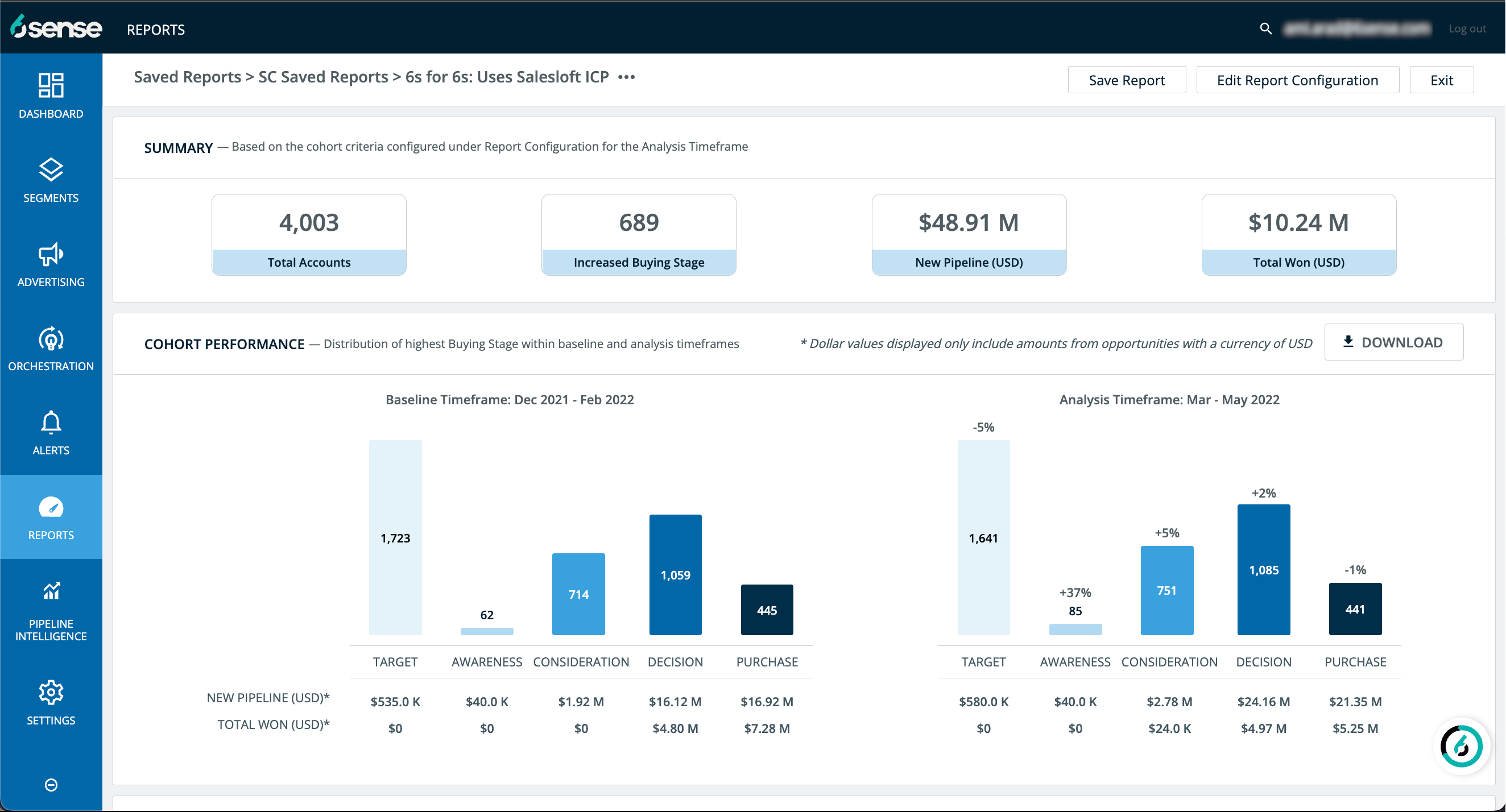
6sense is redefining sales prospecting by using AI to help businesses find, engage, and convert high-value leads with precision. Instead of waiting for potential customers to fill out forms or respond to cold emails, 6sense’s AI-driven platform analyzes online behavior, intent signals, and engagement patterns to identify prospects actively searching for solutions.
Its predictive analytics determine which leads are most likely to convert, allowing sales teams to focus their efforts on the right opportunities at the right time. Beyond just identifying leads, 6sense personalizes outreach by providing data-driven insights into what prospects care about, ensuring every message feels relevant and timely.
The platform also integrates seamlessly with multiple marketing and sales channels, ensuring that engagement remains consistent across emails, ads, and direct outreach. What makes 6sense truly powerful is its ability to continuously learn and refine prospecting strategies, ensuring businesses stay ahead of the competition.
By eliminating guesswork and delivering high-quality leads with actionable insights, 6sense is proving that AI isn’t just an enhancement to sales prospecting—it’s the future of smarter, more effective sales engagement.
The Future of AI in Sales Prospecting
With continuous advancements in machine learning, predictive analytics, and automation, AI is no longer just a supporting tool—it’s becoming an essential driver of sales growth. Looking ahead, AI will not only refine lead generation but also shape how businesses engage with prospects, optimize outreach, and close deals more efficiently.
Emerging AI trends in sales development
AI in sales is shifting from basic automation to more advanced decision-making capabilities. Here are some key trends that will define the future of AI for sales prospecting:
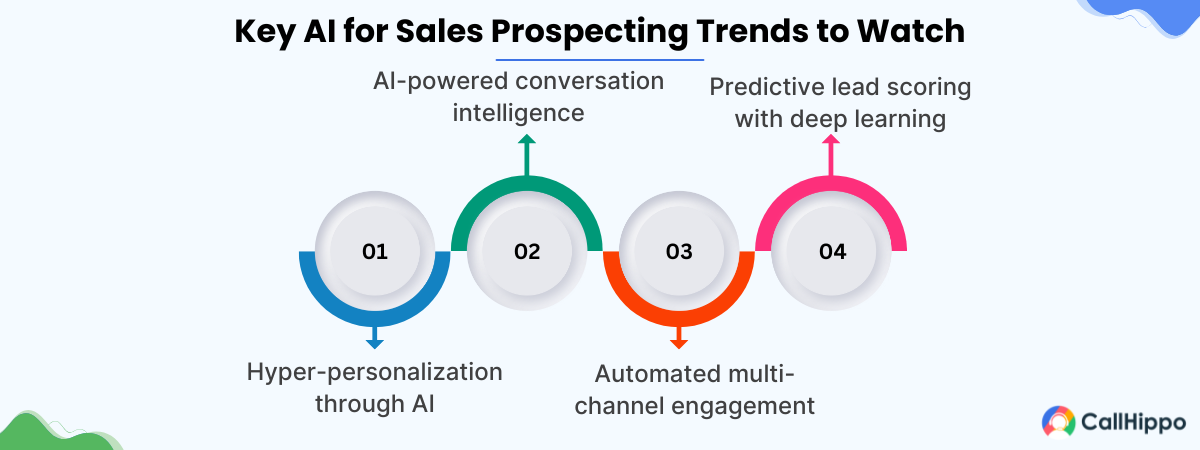
1. Hyper-personalization through AI
AI-driven tools are moving beyond generic outreach by leveraging real-time data and behavioral insights to craft highly personalized sales pitches. Advanced AI models will predict customer needs based on past interactions, industry trends, and intent signals, making outreach more relevant and engaging.
2. AI-powered conversation intelligence
AI is revolutionizing sales conversations by analyzing call transcripts, email exchanges, and chat interactions to extract insights. This helps sales reps refine their approach, respond to objections more effectively, and identify winning strategies based on past successes.
3. Automated multi-channel engagement
The future of sales prospecting lies in AI’s ability to coordinate outreach across multiple channels—email, social media, chatbots, and even voice assistants. AI-powered sales assistants will ensure consistent and timely follow-ups, nurturing leads at scale without human intervention.
4. Predictive lead scoring with deep learning
AI’s predictive analytics capabilities will continue to improve, allowing businesses to score leads with greater accuracy. Machine learning algorithms will analyze customer intent signals, engagement patterns, and demographic data to rank leads based on their likelihood to convert.
3 Key role of AI in B2B and enterprise sales
AI is particularly impactful in B2B sales, where long sales cycles and multiple decision-makers complicate the prospecting process. Here’s how AI is reshaping enterprise-level sales strategies:
- Computer programmers and copywriters are already using generative AI to develop code and draft text, increasing their productivity by at least 50%. The same is true for salespeople.
1. Intelligent account-based marketing (ABM)
AI enhances ABM by identifying high-value lead and tailoring outreach efforts. It helps sales teams focus on prospects that align with their ideal customer profile, increasing conversion rates.
2. Real-time market insights
AI tools continuously scan market trends, competitor activity, and industry shifts to provide real-time insights. This enables sales teams to adjust their strategies and offer timely solutions to prospects.
3. AI-powered CRM automation
AI-driven CRM systems eliminate manual data entry, track customer interactions, and suggest optimal follow-up actions. This allows sales reps to spend more time building relationships rather than managing data.
Conclusion
AI is changing the way sales teams find and connect with potential customers. Instead of spending hours searching for leads or guessing which prospects are the best fit, AI helps automate these tasks, making the entire process faster and more accurate. With AI-driven tools, sales teams can focus on what they do best—building relationships and closing deals.
But AI isn’t here to replace human interaction. The best sales strategies combine AI’s efficiency with the personal touch that only real conversations can bring. Businesses that embrace AI will now stay ahead of the competition and work smarter, not harder. If you haven’t already explored AI for sales prospecting, now is the time to start.
FAQs About AI for Sales Prospecting
1. How does AI improve lead generation?
AI makes lead generation faster and more effective by analyzing large amounts of data to find high-potential prospects. It automates tasks like researching leads, scoring them based on conversion potential, and personalizing outreach. AI also tracks engagement, helping sales teams focus on the right prospects at the right time, leading to better results with less manual effort.
2. What kind of data does AI for sales prospecting rely on?
AI tools use a mix of data to identify and qualify leads, including demographics, firmographics, behavioral data, CRM data, and intent signals. By combining these data points, AI helps sales teams target the right prospects with relevant messaging.
3. How do I choose the right AI tools for my sales team?
Look for an AI tool that integrates with your CRM, automates lead research, and personalizes outreach. It should have predictive analytics to prioritize leads, be easy to use, and scale with your team. Also, check for good customer support and training resources to ensure smooth adoption. The right AI tool will save time, improve lead quality, and help your team close more deals.

Subscribe to our newsletter & never miss our latest news and promotions.









